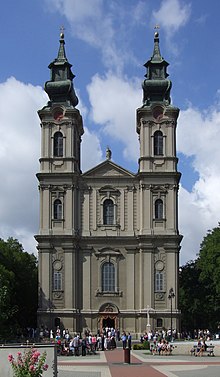Roman Catholic Diocese of Subotica
Diocese of Subotica Dioecesis Suboticanus Суботичка бискупија | |
|---|---|
 | |
| Location | |
| Country | |
| Ecclesiastical province | Belgrade |
| Metropolitan | Archdiocese of Belgrade |
| Statistics | |
| Area | 8,042 km2 (3,105 sq mi) |
| Population - Total - Catholics | (as of 2010) 1,012,821 289,591 (28.6%) |
| Parishes | 114 |
| Information | |
| Denomination | Catholic |
| Sui iuris church | Latin Church |
| Rite | Roman Rite |
| Established | 10 February 1923 (As Apostolic Administration of Jugoslavenska Backa) 25 January 1968 (As Diocese of Subotica) |
| Cathedral | Cathedral of St. Teresa of Avila in Subotica |
| Current leadership | |
| Pope | Francis |
| Bishop | Ferenc Fazekas |
| Metropolitan Archbishop | László Német |
| Bishops emeritus | János Pénzes |
| Map | |
 Map of organization of Catholic Church in Serbia Subotica Bishopric - Yellow | |
| Website | |
| suboticka-biskupija.info | |

The Diocese of Subotica (Latin: Dioecesis Suboticana, Serbo-Croatian: Subotička biskupija, Суботичка бискупија, Hungarian: Szabadkai Egyházmegye) is a Latin diocese of the Catholic Church in Serbia. It is subject to the Roman Catholic Archdiocese of Belgrade. The Diocese is centered in the city of Subotica.
Territory
[edit]The Diocese of Subotica encompasses the Serbian part of the Bačka region, which is situated in the Autonomous Province of Vojvodina.
The diocese's cathedral is the Cathedral of Saint Teresa of Avila in Subotica, dating back to 1779.
The diocese is multi-ethnic and has members primarily from the sizable Hungarian, Croat and Bunjevci communities, among others.
History
[edit]Until the end of First World War, the territory of the present-day Diocese of Subotica belonged to the Roman Catholic Archdiocese of Kalocsa. After the collapse of Austria-Hungary, region of Southern Bačka was incorporated into newly formed Kingdom of Serbs, Croats and Slovenes (later known as Yugoslavia). On 10 February 1923, the Apostolic Administration of Yugoslav Bačka was created. Before the end of Second World War, there was a sizable number of Roman Catholic Germans in the region of Bačka. On 25 January 1968, apostolic administration was elevated into the rank of diocese as "Diocese of Subotica". In 1986, it was placed under metropolitan jurisdiction of Roman Catholic Archbishop of Belgrade.
From the middle 1980s, and especially during the 1990s, number of Catholics in the territory of this diocese decreased due to various reasons, including low birth rates among local Roman Catholics, economic emigration, and ethnic tensions of the Yugoslav wars.
Administrators and bishops
[edit]Apostolic Administrators of Jugoslavenska Bačka
[edit]- (1923–1958) Lajčo Budanović, since 1927 as titular bishop of Cisamus
- (1958–1968) Matija Zvekanović, titular bishop of Burca
Diocesan Bishops
[edit]- (1968–1989) Matija Zvekanović
- (1989–2020) János Pénzes
- (2020–2022) Slavko Večerin
- (2023–present) Ferenc Fazekas
Auxiliary bishop
[edit]- (1955–1958) Matija Zvekanović, titular bishop of Burca
Education
[edit]The diocese runs the only Catholic high school in the country, the Paulinum gymnasium.
Press
[edit]Hitélet is the oldest Roman Catholic monthly magazine of the diocese in Hungarian, founded by László Huzsvár, the later bishop of Zrenjanin.
Hírviviő is the weekly Roman Catholic magazine of the diocese in Hungarian.
Zvonik is a Roman Catholic magazine founded by Croat priests from Roman Catholic Diocese of Subotica. It's being published in Croatian.
Notable individuals
[edit]Blessed Mary of Jesus Crucified Petković solicited for help in this Diocese and founded children's homes (for poor and abandoned children) and monasteries of her Order, Order of Daughters of Mercy.
